If you are looking for Parking Areas where you can park your Camper,
You will probably find it helpful to know the types that exist.
Rest areas, picnic areas, campgrounds, parking lots, campgrounds, and agricampgrounds–the options are many and each is designed for a different type of stopover.
In this article, let’s find out the differences between all these RV parks and the best strategies for finding them!
THE RIGHT REST AREA BASED ON YOUR AND YOUR VEHICLE’S NEEDS!
There are so many options for stopping with your RV, and it is certainly easy to get confused.
Starting from Free Parking (which essentially means parking in a free place, but without any kind of service) to Camping Sites (organized RV accommodations where you can even find water parks), the parking options for an RV as well as being numerous, differ from each other in the amenities they offer, the services available and, of course, the daily price.
Depending on the characteristics of your RV (electrical system, water tank capacity, value etc.), and your intended use (relaxing vacation, full-time trip, road-trip, weekend etc.) you will probably have different needs and parking preferences from time to time.
Therefore, knowing the various rest area options around you and understanding their characteristics, how they work, and how to find them; it is definitely Helpful to make the most comfortable, most convenient choice and most importantly to avoid the stress that can often result from having to park a large vehicle.
In this article, we will look at the typical features of each type of RV parking area and the differences between the various options.
In addition, in each paragraph you will find tips for finding the best rest stops around you that best reflect the needs of you and your vehicle.
Happy reading!! 😀
TABLE OF CONTENTS
Camper Parking Areas:
The DEFINITIVE GUIDE to parking your Van!
1. The Free Stop
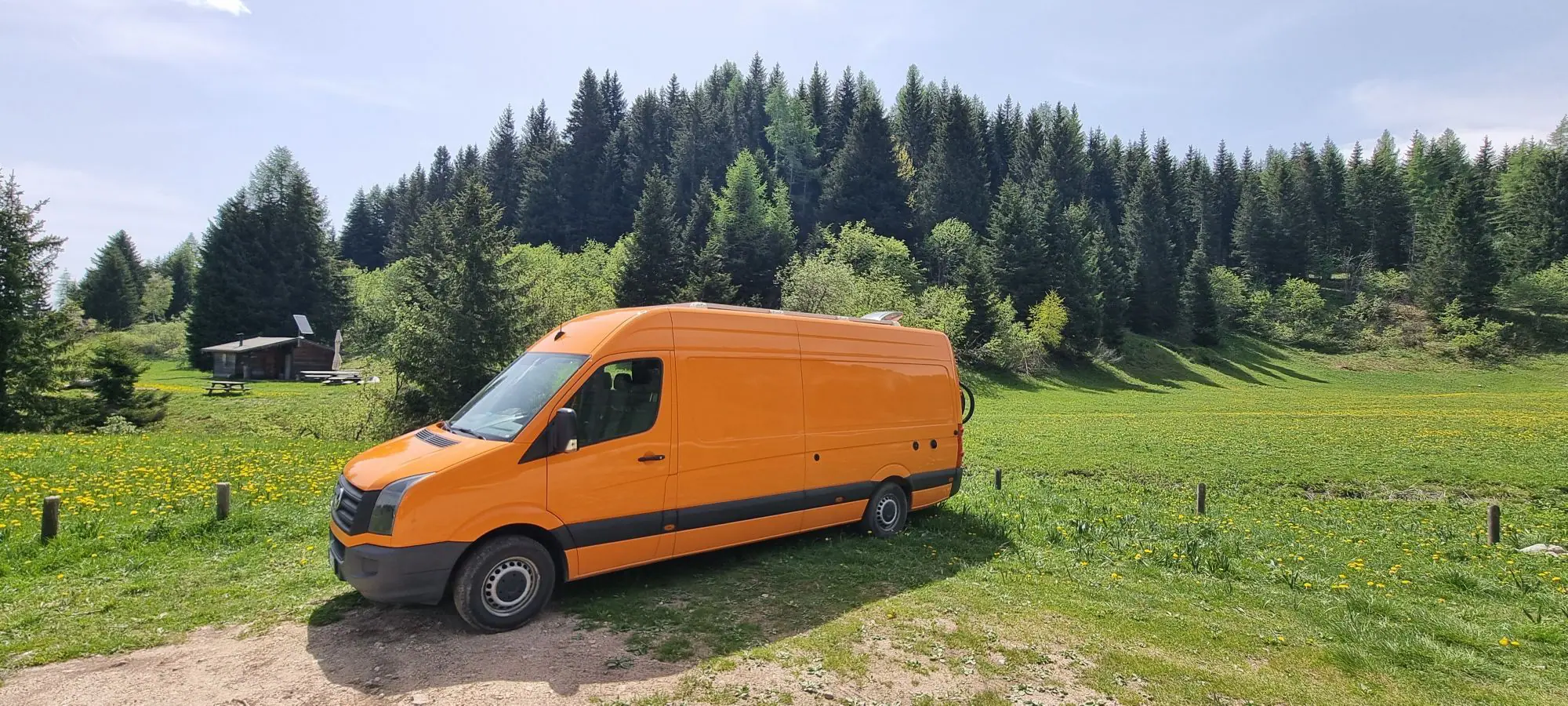
1.1 WHAT IS FREE PARKING?
Parking your RV in “Free Parking,” essentially means parking it in a free and clear spot where you do not have to pay any kind of fee.
1.2 THE ADVANTAGES OF FREE PARKING
Free Parking is certainly the solution ideal for those looking for a no-cost parking, but also often for those looking for a parking away from the beaten path or the hustle and bustle (a remote parking area in front of the sea or high in the mountains, in a forest, in the hills etc).
1.3 THE DISADVANTAGES OF FREE PARKING
The main disadvantage of free parking of course, is theabsence of services (water topping up, water column, gray water discharge etc.). For this reason, before embarking on a free-for-all adventure, it is a good idea to make sure that your campervan has everything you need for the days you plan to stay away from the equipped rest stops.
If you plan to stay for long periods of time in the wild (like us!), probably install solar panels, a spacious compressor refrigerator and a capacious clear water tank are all good investments that will provide you and your vehicle with a greater autonomy (And the costs will easily come back thanks to not always having to pay for an equipped area or campsite).
Water, electricity, fuel, and food are in fact the four main factors that normally determine how much time an RV can spend “on the loose” without relying on outside services and equipped rest areas.
Also, not to be underestimated, is the “tolerance” of different municipalities to free parking, which is usually precisely tolerated for 1-2 nights, but not more. Changing places often is ideal to avoid problems.
1.4 HOW TO FIND FREE PARKING AREAS?
Where can you legally free-stay with your RV?
This is a question that often nags many campers and vanlifers, seemingly complicated but at the with such a simple answer: where there is no ban, and where you don’t disturb anyone.
The world is really full of free parking areas, and with a little patience a place to spend the night can always be found everywhere.
The important thing is always to remain vigilant and make sure that on the one hand there are no signs indicating a no RV parking zone, and on the other hand that our vehicle is not in the way or inconveniencing anyone (not encroaching on sidewalks, not closing any walkways, etc.).
In addition, it is important to note that it is one thing to “stop” (park the vehicle), and one thing to “camp” (pull out table, chairs or otherwise place anything other than the four wheels of the vehicle on the ground) which is generally prohibited in Italy. If you are interested in learning more about free camping in Italy I leave you with this in-depth article.
To find free rest areas nowadays, in addition to the classic method of driving around, there are some great apps that can make our search much easier by showing us with just a few clicks all the best free rest areas around us, already tried and reviewed by other campers.
Our two favorite apps for finding free parking areas are Park4Night e Caramaps (if you’re interested in learning about others, I recommend reading the article The Best 15 Apps for Traveling by Camper.). Thanks to these two apps and the thousands of reviews on them, we have always found picturesque, scenic, and quiet places to spend the night, so we feel we can recommend them.
2. The Parking Lot
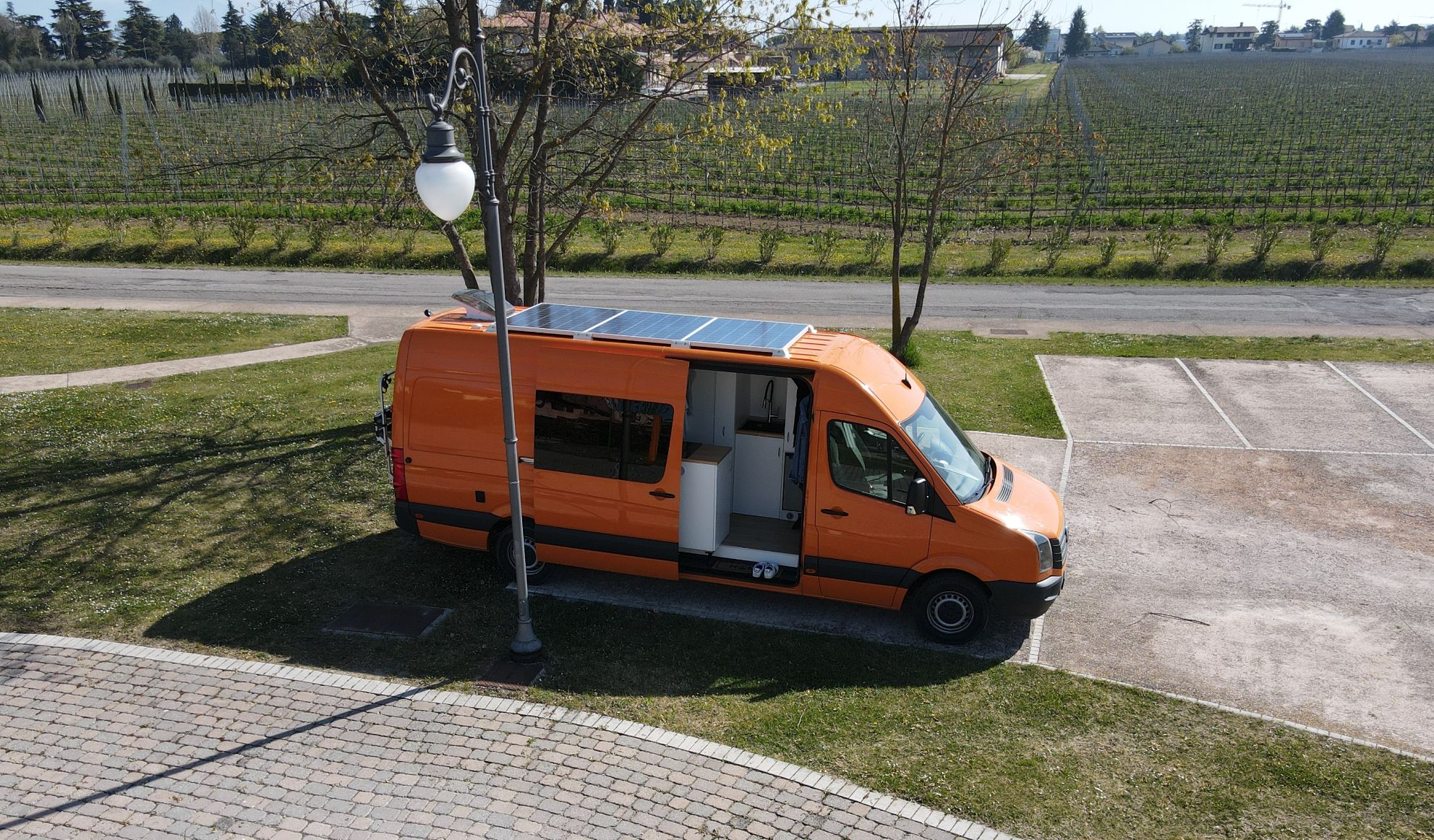
2.1 WHAT IS CLASSIC PARKING?
As with cars, parking is that area demarcated by white (free) or blue (paid) lines .
Specially marked parking lots for RVs usually measure between 7-8 meters, while parking lots for cars are generally 5 meters long.
2.2 THE ADVANTAGES OF PARKINGS
Placing your RV in a parking lot gives you the security of being parked legally (for free with white lines, or by paying a fee on blue lines), and there is generally no stay limit as there is for free parking (unless specified by appropriate signs).
This makes the parking lots the ideal place to leave the RV when moving during the day to trek, visit cities, beaches or other attractions.
2.3 THE DISADVANTAGES OF PARKINGS
As with free parking, the main disadvantages of a common public parking lot are the absence of RV services and the ban on free camping .
In addition, it is worth noting that an RV, given its length, will rarely be able to use common car parking spaces, and that, peeking outside the lines drawn on the ground may be subject to a penalty.
Some generally tolerated RV parking strategies are:
- Have the back of the vehicle “stick out” beyond the end of the parking space (as long as it doesn’t stick out in the way of a sidewalk!).
- Occupy two parking spaces arranged across from each other (paying two parking tickets in case they are metered)
- “cross” parking by occupying 2 or 3 parking spaces (this is only feasible when there are really a lot of parking spaces available, more than could presumably be occupied during the day).
Of course, it is always a good idea to use one’s judgment to analyze the area and figure out where it can likely be safe to park without incurring penalties and where our parking might inconvenience someone.
2.4 HOW TO FIND PARKING FOR YOUR RV?
To find a regular free parking space, the best method is always the classic one: turn and observe until you find the right place.
On the Internet also, a quick googling “RV parking PostoX,” might give you a hand in checking if there are any parking lots specifically for RVs near you.
3. The Camper Parking Area
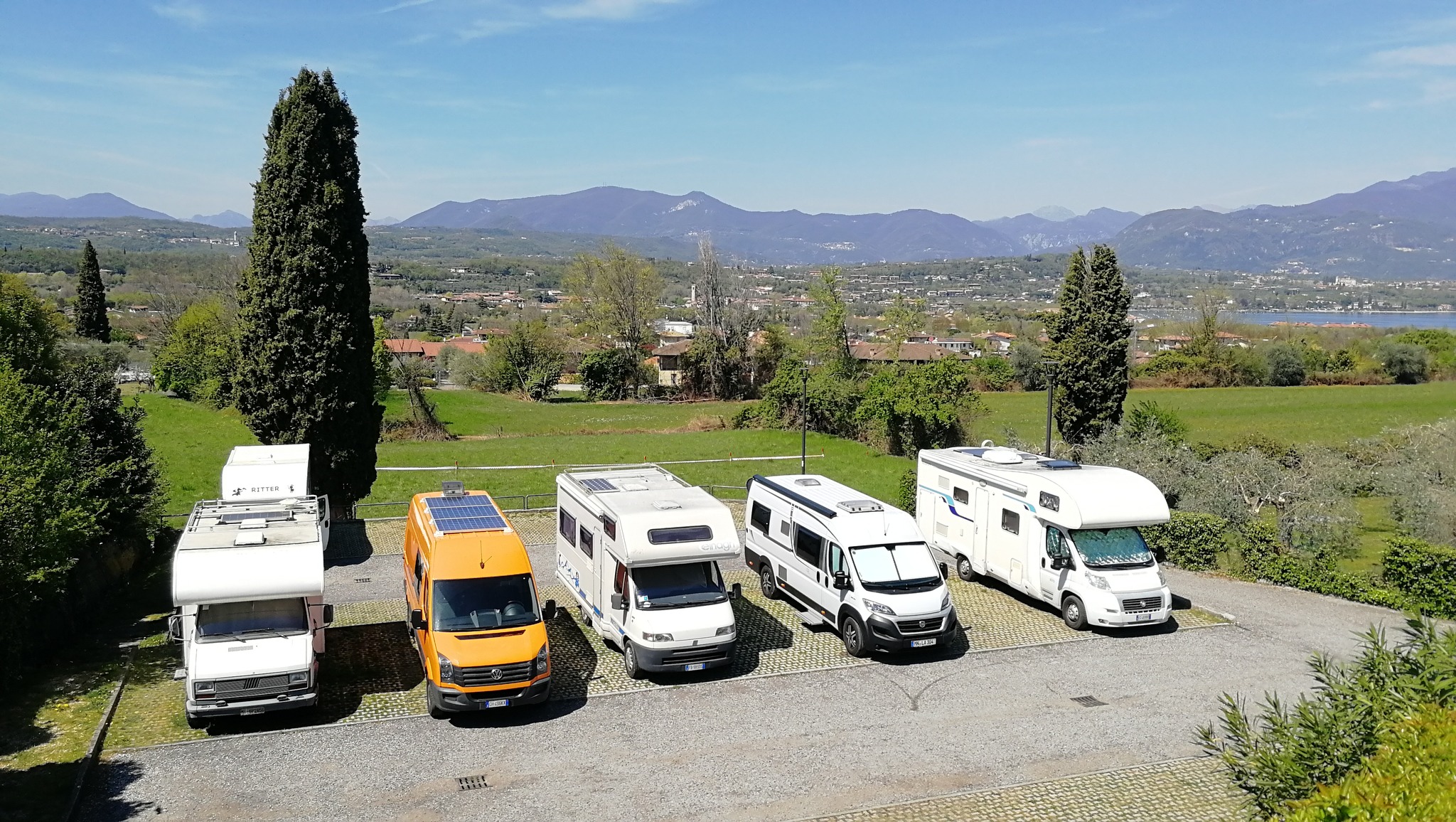
3.1 WHAT IS THE RV PARKING AREA?
The RV parking area is essentially awell-defined area of RV parking with appropriate measurements to accommodate this type of motor vehicle.
3.2 THE ADVANTAGES OF RV PARKS
The advantages you’ll find in RV parking areas are parking that is large enough not to require parking “strategies,” the security of being parked legally (for free on white lines, or by paying a fee on blue lines), and no time limit on parking (unless otherwise indicated).
In addition, some rest areas (not all!) offer drinking water topping up and sewage disposal. In simple rest areas, electricity columns are generally not found or if they are found, they are not commonly sufficient for all available pitches.
3.3 THE DISADVANTAGES OF THE NORMAL STAGING AREA
The main disadvantages of a generic RV parking area are the absence of complementary RV services (gas station, water, sanitary etc.) and the prohibition of free camping.
In fact, it should be noted that they are called “rest areas” and not “camping areas”-that is why, although these rest areas are intended to accommodate RVs, during the stopover it is strictly forbidden to engage in any activity attributable to camping: from pulling out the step, to picnic with tables and chairs, to awning, parking feet etc.
3.4 HOW TO FIND RV PARKING AREAS?
RV sites are generally located in convenient places to visit nearby areas (near parks, stations, bus stops, in green lawns, or on the side of the road) and require no reservations (ideal for on-the-road travel!).
In addition to the classic google, the best App to search for RV parking areas (both normal and equipped) is definitely again Caramaps, where you can view any services offered and reviews from those who have already been there before you.
In addition, below you will find links to other Italian sites specializing in both equipped and unequipped RV sites:
- Area-Sosta-Camper.it – Italian site designed to be used On-the-Go via smartphone, quick and fast allows you to find all RV parking areas around your location with all necessary information
Camper.it
– Parking Areas in Italy divided by Region with photos, reviews, and contacts (email, phone, websites)
- CamperOnline.it – Stopover areas divided by region and type (stopover, agritourism, camping etc.) with all the information you need to plan your stopover
As English resources instead, I recommend using the ever-trusted APPs:
- Caramaps:Number 1 app in EU/US for finding RV parkings and facilities
- Park4night: Number 1 app in EU/US for finding parking for passing the night, both free and paid.
4. The Equipped Parking Area
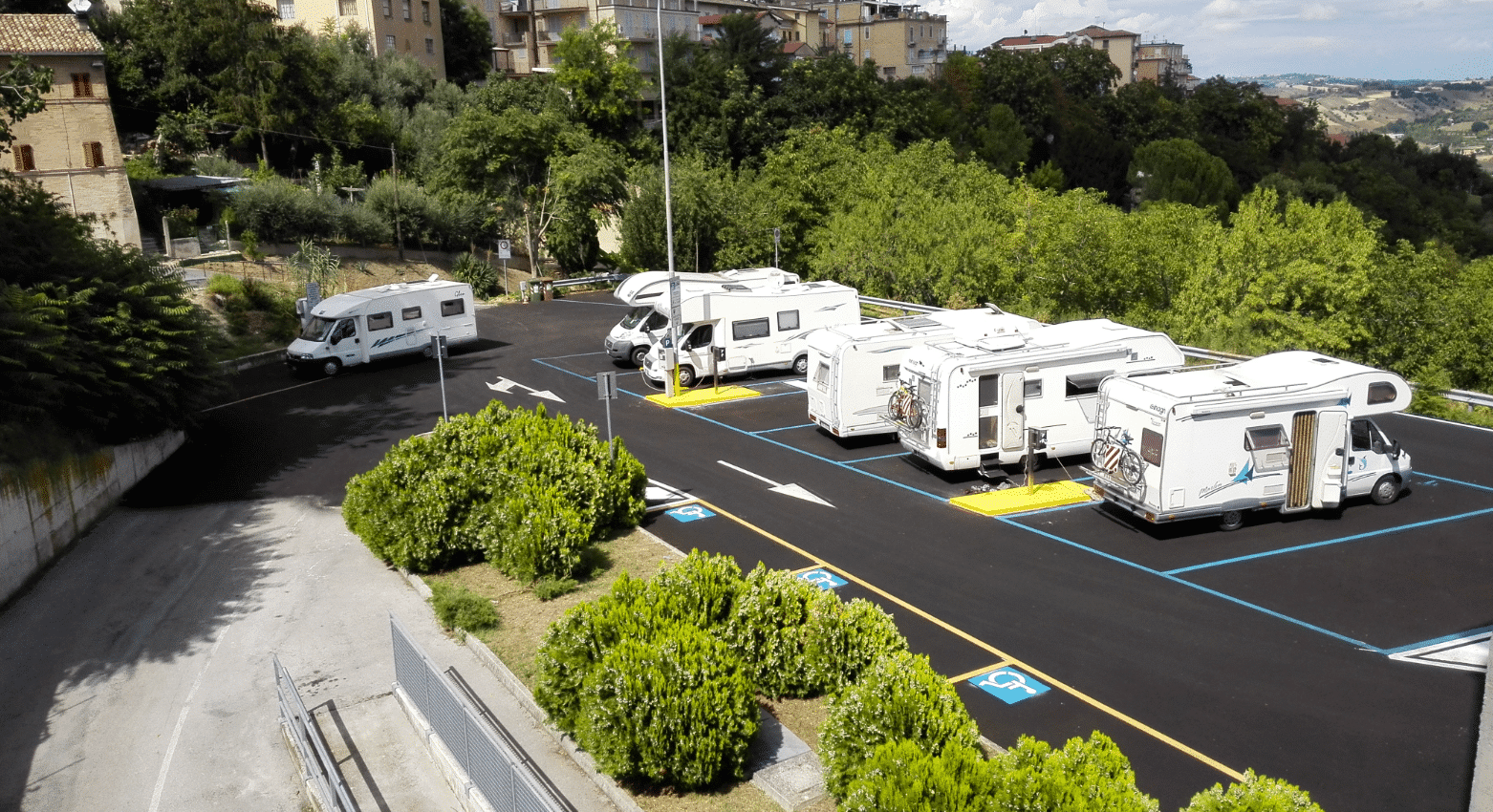
4.1 WHAT IS THE EQUIPPED REST AREA?
Traveling in an RV, for many people is synonymous with freedom: bringing along your own little house on wheels with everything you need to travel and live, wherever you want, is truly a magical experience!
Unlike an actual house however, it is good to remember that we are not laced to an outside water supply, that we are not attached to the power grid, and that obviously waste, both solid and liquid, has to be disposed of sooner or later (no one will come and pick it up in front of our door!).
A motorhome (or a Do-It-Yourself camper van) is generally equipped to be autonomous and self-sufficient for anywhere from 2-3 days, to 10-14 days (in the case of vehicles with solar panels, large battery banks, water recycling, and very large water tanks).
After longer or shorter periods of time however, all RVs have in common the need to find a foothold that offers the necessary services to be able to reset and restart: replenish drinking water, drain sewage, recharge batteries, dispose of trash etc. etc.
The first of these “footholds” we see are the equipped rest stops.
4.2 THE ADVANTAGES OF RV EQUIPPED AREAS
The main advantage of choosing an equipped rest area is essentially the services offered here.
Among these facilities, one can commonly find: water loading, toilet cassette flushing, sump flushing, 220V pillar, garbage cans, restrooms with toilets, showers, night lighting, and, more occasionally, even bar/custodian, Wi-fi, bar service and catering.
Obviously, not all rest areas offer all of the services listed, and it is a good idea, before going to a particular rest area, to check for the services you need.
A secondary advantage, as with regular rest areas, is that the equipped rest areas are usually located in strategic areas for visiting the surroundings: near lakes, mountain areas of interest, beaches, public transportation stops, etc.
4.3 THE DISADVANTAGES OF THE EQUIPPED REST AREA
The main disadvantage of equipped rest areas is essentially that they are not free (despite the fact that even municipal ones rarely happen to be completely free).
That said, the prices are usually very reasonable and justify the costs incurred by the municipality or private individual to provide you with the services you need.
Another minor disadvantage, is that normally in Italy, camping in equipped areas is limited to a maximum time of 48-72 hours (depending on the municipality/region) and even then no activity attributable to camping is allowed.
4.4 HOW TO FIND RV PARKING AREAS?
As with basic rest areas, the best App for searching for serviced rest areas.
Caramaps
, where you can quickly search for the nearest equipped areas to us (based on the service we need) and rate them based on previous user reviews.
As before in addition, the sites can also be used. Area-Stopping-Camper.it, Camper.co.uk, CamperOnline.co.uk and related apps (available for both android and IOs).
5. The Camping Area
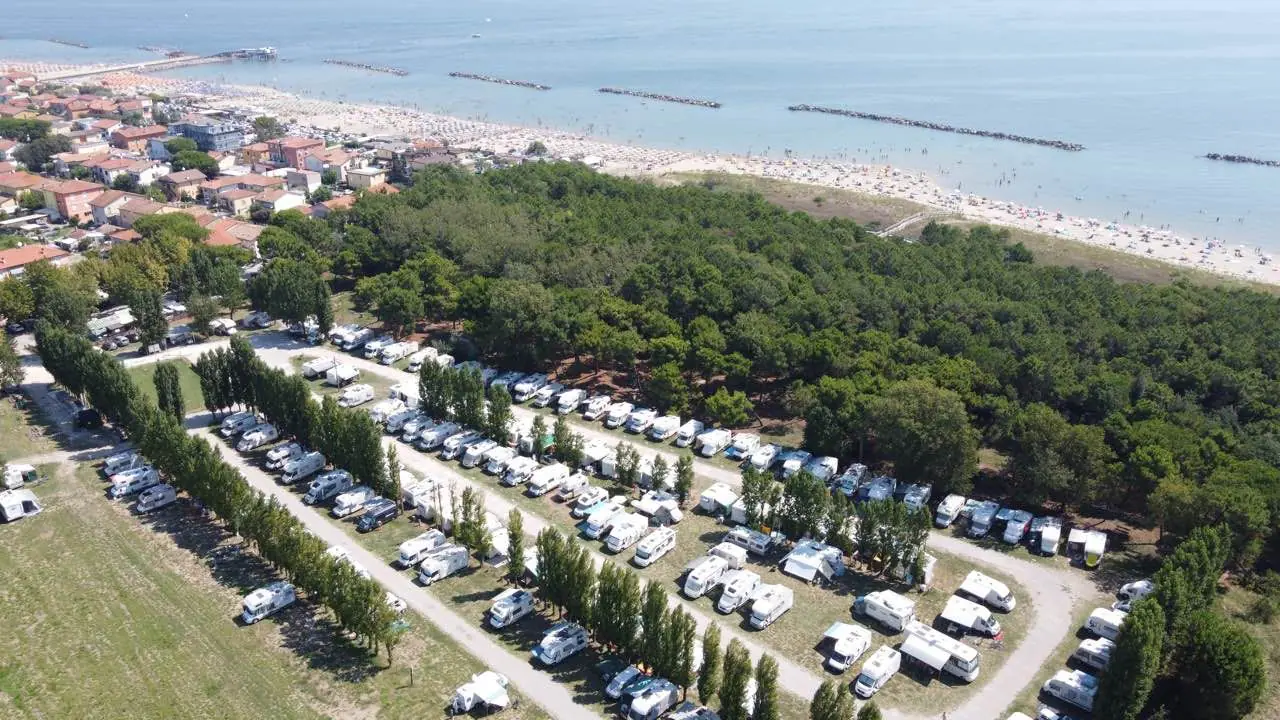
5.1 WHAT IS THE CAMPING AREA?
A camping area is an unrestricted area (may be on a lawn, gravel, concrete, or other) open to campers, caravans, trailers, and tents, where you can park and camp without the restrictions imposed by rest areas or picnic areas.
Normally, a camping area also has all the services of the equipped areas and extra services for tourism and recreation.
5.2 THE ADVANTAGES OF CAMPING AREAS
The main advantages of a camping area , compared to the options seen so far, are the Freedom to be able to experience the outdoors without the danger of incurring penalties, the sociality of place (it is much easier to meet other people and make friends when you can live out of your vehicle!) and the services that this area offers.
The most common services found in camping areas, in addition to those merely related to vehicle service (loading, unloading, worlds, electricity etc.), often include playgrounds, picnic areas, barbeque station, food services, tourism information center, and sometimes even swimming pools and entertainment.
5.3 THE DISADVANTAGES OF CAMPING AREAS
The main difference between Area Camping and an actual Campground/Camping, lies in the fact that the camping area is less “structured,” the pitches are less demarcated and separated from each other, and in general there is less control both at the entrance and within the area.
For some, this could be a disadvantage (especially if you like to have your own private place where you can relax in peace), while for others it could be an advantage (more opportunities for social interaction!).
That said, the difference between Area Camping and Camping is very subtle and depending on the area you are traveling in a given area might be defined one way rather than the other. Normally, both camping areas and Campgrounds charge a fee and in both cases it is often recommended to make reservations to be sure of finding a place (especially in high season!).
5.4 HOW TO FIND CAMPING AREAS?
To find the camping areas closest to you and all the information related to them, once again the best solution is technology (we live in the future now!).
Below, find the most authoritative Italian sites on which to search for camping areas (and campgrounds!):
Camping.it – Italian site to Find Camping Areas, Campsites and Camper-Friendly Villages all over Italy, focused especially on vacation destinations (where you park for several days and enjoy the place), but not only. On camping.co.uk you will find information on services, restrictions, pets, accessibility, photos and reviews useful in making your choice.
CamperContact.com. – A really comprehensive site, with an app designed to easily contact the various facilities (with a simple button that makes the call directly). Personally, I love CamperContact’s app because of the ease of use, the huge database (over 37 thousand campsites and half a million reviews), and especially because it is not just an app focused in Italy but also for abroad (we travel most of the time outside of Italy).
CamperLife.com.au. – Italian site for searching RV parks. Of this site, especially noteworthy is the search filter that lets you search only for the desired type of stopover (e.g., municipal, agritourism, highway area, camping area, camper service, equipped area etc.).
6. The Campground (or Camping)
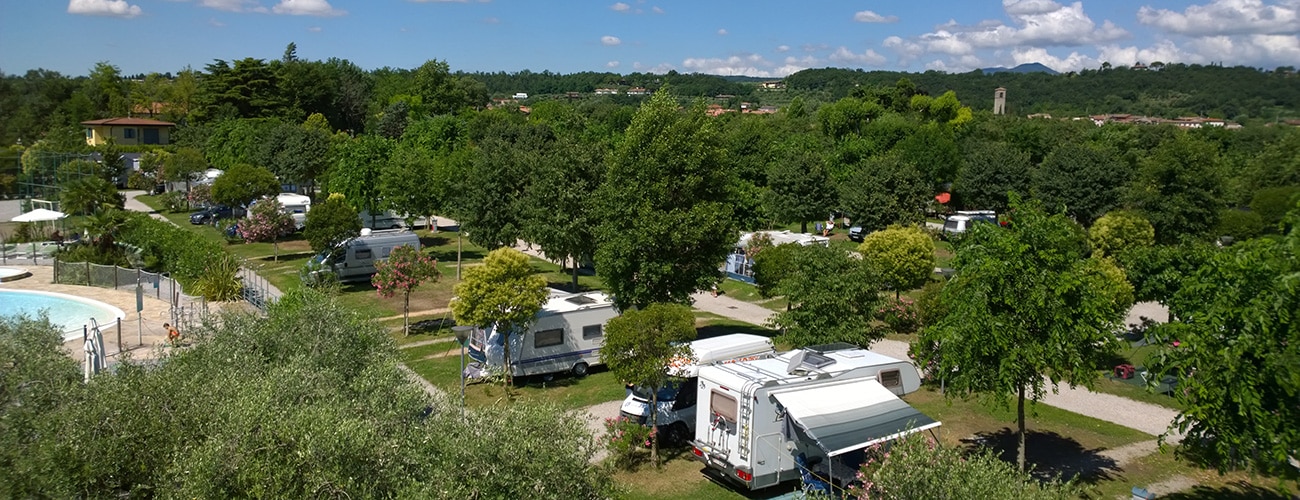
6.1 WHAT IS CAMPING?
A campground (also called a “campsite”) is a well-organized facility where, by paying a daily fee, you can stay with your RV and camp without restrictions.
Camping is ideal in case you are looking for relaxing vacations according to your tastes and without worries regarding RV facilities.
6.2 THE ADVANTAGES OF CAMPINGS
First, campsites are usually located in pleasant and often scenic areas where one can enjoy the surrounding landscape and nature.
Inside them, you will find virtually everything you need for the maintenance of one’s vehicle (220V pillar, water loading and unloading, mondizie collection, gas cylinders etc.) as well as various extras (toilets, showers, food service, bars but also in the larger beaches, supermarkets, water parks, tourism services and entertainment).
In addition, each campsite has its own particular style (as with hotels) and can be aimed at a particular target camper and clientele (e.g., there are “animal-friendly” campsites, “family-friendly” campsites, “aqua-park” campsites, “wellness” campsites, “glamping” campsites, “naturist” campsites, “digital” campsites, “entertainment” campsites, and you name it!).
Therefore, if you want to spend a totally relaxing vacation, you will not find it difficult to find a campsite that perfectly suits your tastes and needs.
Personally, I can say that as much as we love free parking (we used to move every day), every once in a while stopping and relaxing in an organized area like a campsite and not having to think about the various services is just relaxing!
6.3 THE DISADVANTAGES OF CAMPING/CAMPING SITES
Choosing to stay at a campground is similar to staying at a hotel: you need time to check in and check out, you often need to make reservations in advance, and of course, of all parking options, it has the highest cost.
Camping is the best choice for relaxing vacations, but it is definitely not the best option for a touch-and-go, road-trip, stopping over while visiting a city, or simply saving money.
6.4 HOW TO FIND THE MOST SUITABLE CAMPSITE FOR YOU?
Below you will find a list of the best sites where you can find Campsites and Campings throughout Italy:
Camper.co.uk. – Find all campgrounds, discover in the articles the best campings in each category, see galleries, contacts and services of each campground, region by region.
CamperLife.com. – As mentioned earlier, on CamperLife you can use the filter to view only the stopover option you are interested in (in this case, camping).
CamperContact.com. – A site and app to find the information you really need and organize things quickly. Personally, I love calling by phone to arrange things on-the-go, and CamperContact I think is the best app for getting in touch directly with accommodations.
Camping.info – One of the largest sites for finding RV sites and campsites throughout Europe, with over 23,000 sites spread across the continent.
CampingEurope.com. – A collection of the best camping sites in Europe. By clicking on the country in which you are interested in searching, this site will send you to the major booking site in that particular country.
7. The Agricamping
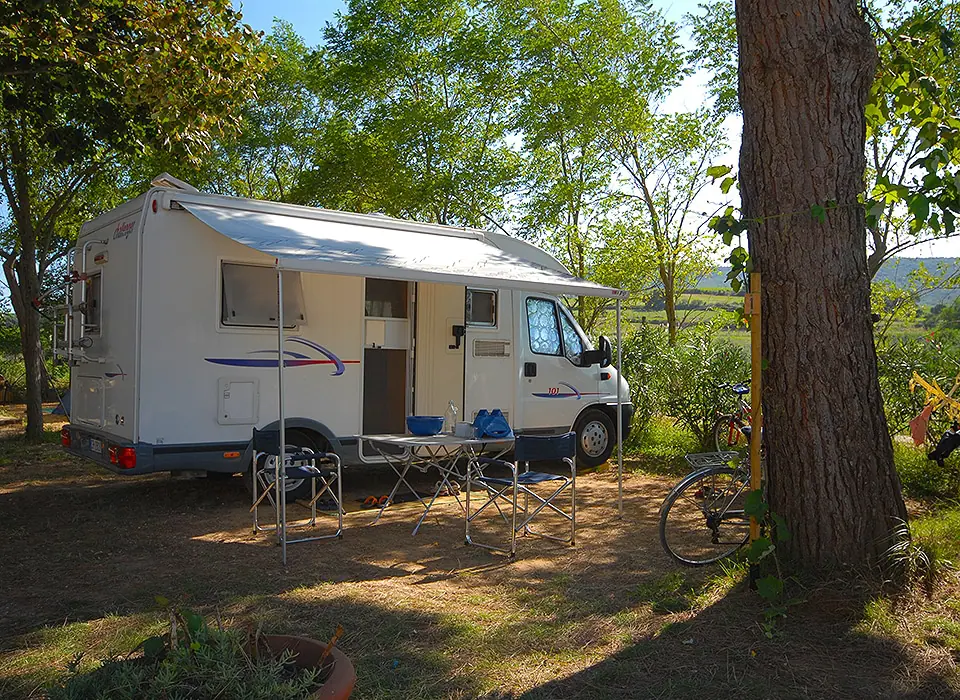
7.1 WHAT IS AGRICAMPING?
And here we come to the last RV staging area option, which is also the one that is seeing the most growth in terms of both demand and supply over the past 5 years: Agricamping.
Agri-camping, essentially consists of staying in theprivate area of an agritourism or farm that makes its land available, either in exchange for a daily fee or by committing to buy food produced by the agritourism itself.
This type of staging area is finding particular interest among vanlifers and campers as it is a practical solution both to support the local economy of the places being visited and to have the opportunity to stop and camp freely in a quiet place surrounded by nature.
Certainly, agricamping can offer amore intimate, personal and sustainable experience than a campground, and it is this different experience that is what is prompting more and more people to choose this type of rest area.
7.2 THE ADVANTAGES OF AGRICAMPING
The agricamping usually offers all the basic services needed to maintain one’s vehicle (water loading/unloading, water column, and garbage collection), in addition to a family environment and an experience connected to nature and the local area.
In fact, agricampgrounds follow the essential rules of campgrounds (so pitches of at least 60sqm, toilets, night lighting and basic vehicle facilities) and are designed for outdoor and nature-oriented vacations.
In addition to this, because of their strategic location, normally off the busiest thoroughfares, agricamps are often the ideal base for trekking, hiking and other outdoor sports trails.
Last but not least, host farms and agritourisms, in addition to producing the energy they offer through renewable sources, normally offer the opportunity to try the local food and wine specialties and possibly buy zero-mile products on site.
7.3 THE DISADVANTAGES OF AGRICAMPING
Staying in an agricamping almost always involves direct (cost/night) or indirect (the purchase of local products) expenses, but normally always proportionate to the service you are offered and the opportunity to camp in nature. Sometimes, however, expenses are really minimal or even absent.
As a second note, it is important to note that in an agricamp. you won’t normally find all the extra-comforts you can find in a real campground (e.g., swimming pools, water parks, entertainment etc.), as these types of facilities are geared toward another type of tourism, a smidgen less “carefree,” less “mass”, but more oriented toward contact with nature.
7.4 HOW TO FIND RV PARKING AREAS
Below you will find the two main Italian sites for searching and booking agricampsites in Italy:
Agricamper Italy: The #1 site and app for booking agricampsites in Italy. Here you will find contacts of farms, vineyards, cottages, dairies and many other unique places to stop and camp with your RV! For 35 Euros, you can purchase the Digital Stopover Guide, which entitles you to free stopovers for up to 24 hours in all affiliated Italian agricampers with no obligation to purchase (although of course, it is always appreciated!).
Camper Online: Using the site’s filter, you can view all of the agricamps registered on the platform and sort them by region they belong to.
8. Useful Tips and Conclusion
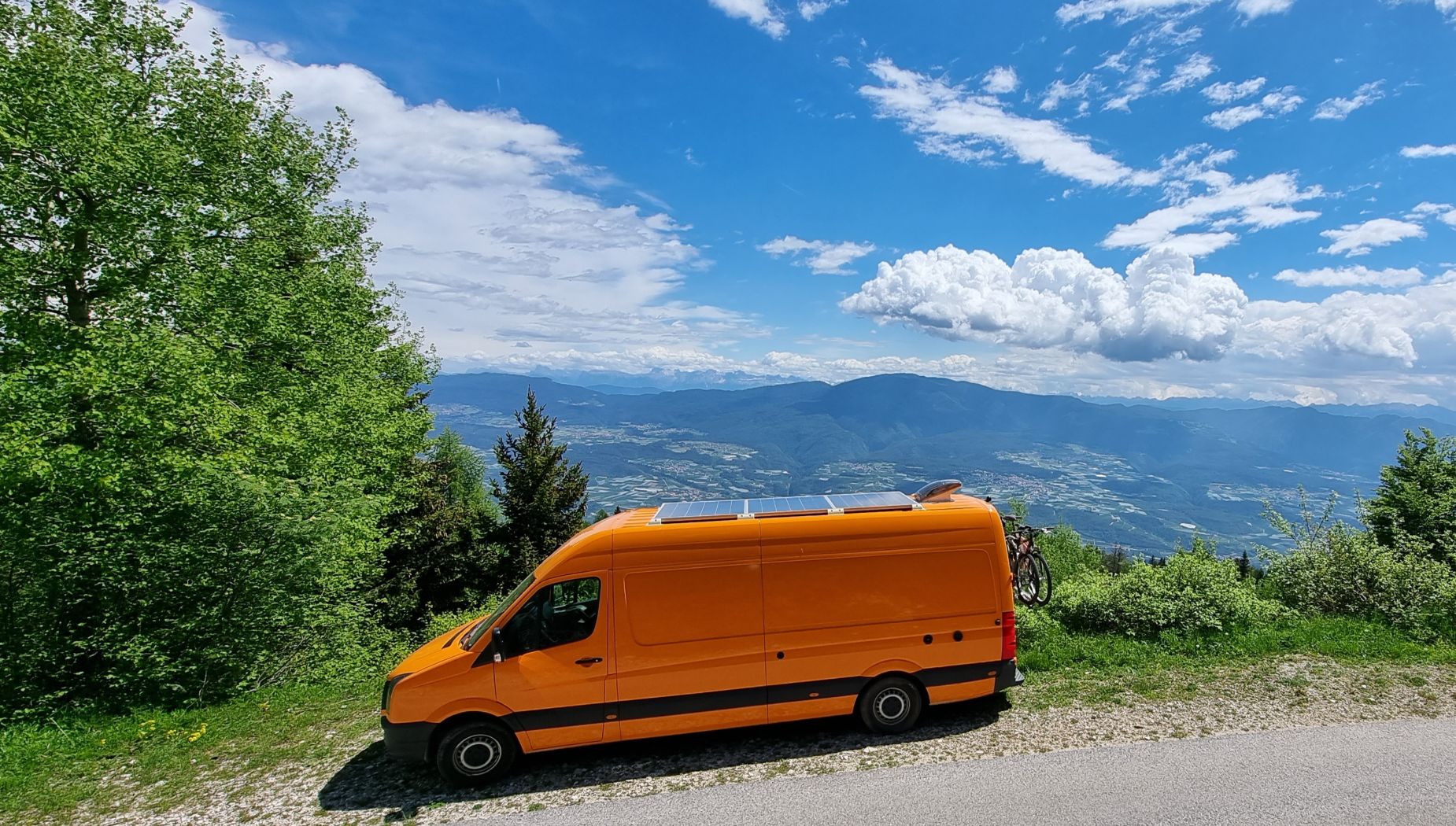
And here we come to the end of the article. These were all the various options of rest areas to park one’s RV.
Before we say goodbye, though, I’d like to leave you with the following6 useful tips to keep in mind to make each of your stops as easy and stress-free as possible:
6 USEFUL TIPS FOR STAYING STRESS-FREE AND SAFE WITH YOUR RV
1. Be sure that your stop does not harass anyone (even unintentionally): Before parking outside an organized area check that there are no prohibitions for RV parking and, at the time of parking, verify that your vehicle Is not in the way of either vehicles on the roadway or pedestrian passage. If the place is isolated and very quiet, you might be tempted to launch into a little free camping, which normally if it doesn’t bother anyone is mostly tolerated (though formally illegal). Be sure, however, not to harass anyone nearby or encroach on private property.
2. Always leave the rest area cleaner than you found it: when you stand at the wheel of your RV you not only represent yourself, but in the eyes of outsiders you represent the entire category of campers and vanlifers. Therefore, it is important to always leave a good impression and behave civilly: sort your garbage, don’t leave dirt around, and even better, maybe do your own small part and clean the parking area around your vehicle. After all, respecting our host place is the least we can do, and a little effort can benefit the whole community.
3. Learn to Use Technology to Your Advantage: In each paragraph of this article I have linked you to useful sites and resources for finding RV parks that best suit your needs and those of your vehicle. Also, if you haven’t already done so, I recommend you also check out the article The 15 Best Apps for Traveling by Camper.. Learning how to use the technology at your disposal will surely save you so much time, stress and money. Take a little time to understand the workings of the apps that most interest you, and you will see that you will benefit in the long run.
4. Keep in mind the difference between parking and camping: parking is essentially standing by placing only the four wheels of your vehicle on the asphalt. Camping, on the other hand, is everything else: table, chairs, positioning feet, step, awning, bbq etc. etc. Keeping in mind the difference between parking and camping and understanding where one and the other can be practiced is critical to avoid unnecessary penalties. In Italy, unfortunately, free camping is legally prohibited and therefore only possible in private areas, camping areas, campgrounds and agricampsites; in other countries, however, laws may be softer and more inclusive.
5. Do not arrive too late: Arriving in the afternoon when the sun is still high is not always possible, but definitely advisable (especially for free parking, in parking lots or rest areas). By arriving early in fact, you will have a chance to look around, study the place where you parked, become familiar with your surroundings, and give your sixth sense a chance to notice any alarm bells (pieces of glass, broken windows, suspicious people etc.). This means that arriving early gives you a chance to change places in case something is not as it should be, and does not force you to make do “wherever” as tiredness does late at night.
6. Caution is never too much: Whether you’re stopping at a free parking lot, a rest area, a campground, agricamping or camping site…caution is never too much! As they say: luck is blind, but on the other hand, misfortune sees very well! The secret to a safe stop then is not to stress unnecessarily (the world out there is not made up of criminals, who are only a very small part of the people you will meet on the road!), But be aware that something can always happen and then take due safety measures to avoid it. This is where our behavior (always be vigilant) and, of course, deterrent, anti-intrusion, mechanical and digital burglar alarms come into play. If you are interested in knowing which are the best anti-theft devices for motorhomes, I leave below the link to the in-depth study Camper Alarm: The Best Models and Which Ones to Choose – Complete Guide.
And with that, that’s it for today. What did you think of the article? Was it helpful and did you encounter the information you were looking for? Did you find inaccuracies or need clarification on some passages? Or do you have any stories from your experience that you would like to tell?
Let me know in the comments below!!! 🙂
Thanks for reading, and as always, see you in the next article! 😀
.
BEFORE YOU GO, CAN I ASK YOU FOR SOME FEEDBACK?
Writing detailed articles like this takes a lot of time and effort..
If you liked it, can I ask you to leave me a feedback message in the comments at the bottom of the page?
For a content-creator, knowing that you are being read and that your efforts are useful to someone is the best motivation to keep writing and doing better 🙂
Let me know what you liked or what you think could be added.
If you’d like, you can also share the article to help other people find it!
Thanks for the help 🙂

Read the Van Conversion Guides
How to Calculate the Right Section of 12V Cables | EASY GUIDE
An undersized cable does not carry enough current. A cable that is too undersized can lead to a fire. An oversized cable, on the other hand, simply costs more and is a waste of money. Are you wondering what is the logicfor choosing one section of cable over...
Bluetti vs Ecoflow | Which is the Best Portable Power Station for RV/Vanlife?
The Portable Power Station is an increasingly used accessory on camper vans and RVs, but when does it really make sense to purchase and own or install one? In this article we try to shed some light on how these systems work, the best options on the market, and the...
Van Conversion DIY: How Much Does It Costs? | My Experience
How much does it cost an entirely DIY van to campervan conversion? The queen of all questions... In this article, I want to show you all the costs of my conversion from start to finish, so that you too can get an idea of what it might cost! ...
Van Electrical Diagrams for your DIY Project – Ready to Install
The Electrical System is often one of the most complicated steps in a DIY van conversion. How much energy is needed? What apparatus/devices to purchase? How to connect them? How much would it cost? These are all doubts and questions that normally everyone finds...
Van Interior Conversion: Best DIY Ideas for your Project!
The Interior Outfitting of a DIY converted van is both an aesthetic and structural choice. In this article, you will find useful information and inspiration ideas for customizing the Walls, the Ceiling, and the Floor of your Van! DIY CAMPERVAN SET-UP:...
Kitchen for Camper | Best DIY Ideas for your Van Conversion
Cooking in Camper is one of those things, that makes you feel at home wherever you are! Gas, Diesel or Electric Stove? What equipment and accessories you need on the Road? How much space do you need? How to assemble the kitchen in your Camper? In this article you will...
The Best Fridge for Your Campervan – Which One to Choose?
Buying a trivalent or compressor RV refrigerator? Horizontal or vertical? 12V or 110/220V? In this article you will find all the information you need to choose the best fridge for Your Van, tailored to your Needs! 🙂 THE REFRIGERATOR IN THE VAN:...
Van Conversion: How to Build a DIY Bed for your Camper Van
A Camper is not a Camper if it does not have a bed. Where to Sleep and... Dream! In this Guide you can find the inspiration you need for creating a DIY Bed in Your Campervan, And I'll show you step by step how I built a Complete Bed/Dinette on my VW Crafter....
DIY Camper Bathroom: How to Self-Build a Toilet
If you are Campering a Van you surely must have wondered: How does the Bathroom in a Motorhome work? In this Guide I show you the various types of Bathrooms on the market, I explain how they work, and I show you how you can Build yourself an entirely...
Best 12V Fan for RV | DIY Installation Guide | Van Conversion
A Roof Fan helps keep your Vehicle's humidity under control and change stale air. In this guide you will find everything you need to know about mounting a Maxxfan Deluxe fan on the roof of YOUR van. ROOF FAN: WHAT IS IT FOR? Keeping an RV's...
How to Build a Shower in a Do-It-Yourself Camper
A Shower in the RV for some people is not necessary, for others it is a real necessity to be totally independent! In this guide I'll tell you how I built the shower of my converted van entirely Do-It-Yourself! INSTALLING A SHOWER IN A...
Complete Guide and Electrical Scheme for your D-I-Y Van Conversion
You dream of transforming your Campervan DIY and have never touched an electrical cable before? Or do you want to implement some changes to your Factory RV? In this guide you will find EVERYTHING (absolutely EVERYTHING!) you need to know to create the perfect DIY...

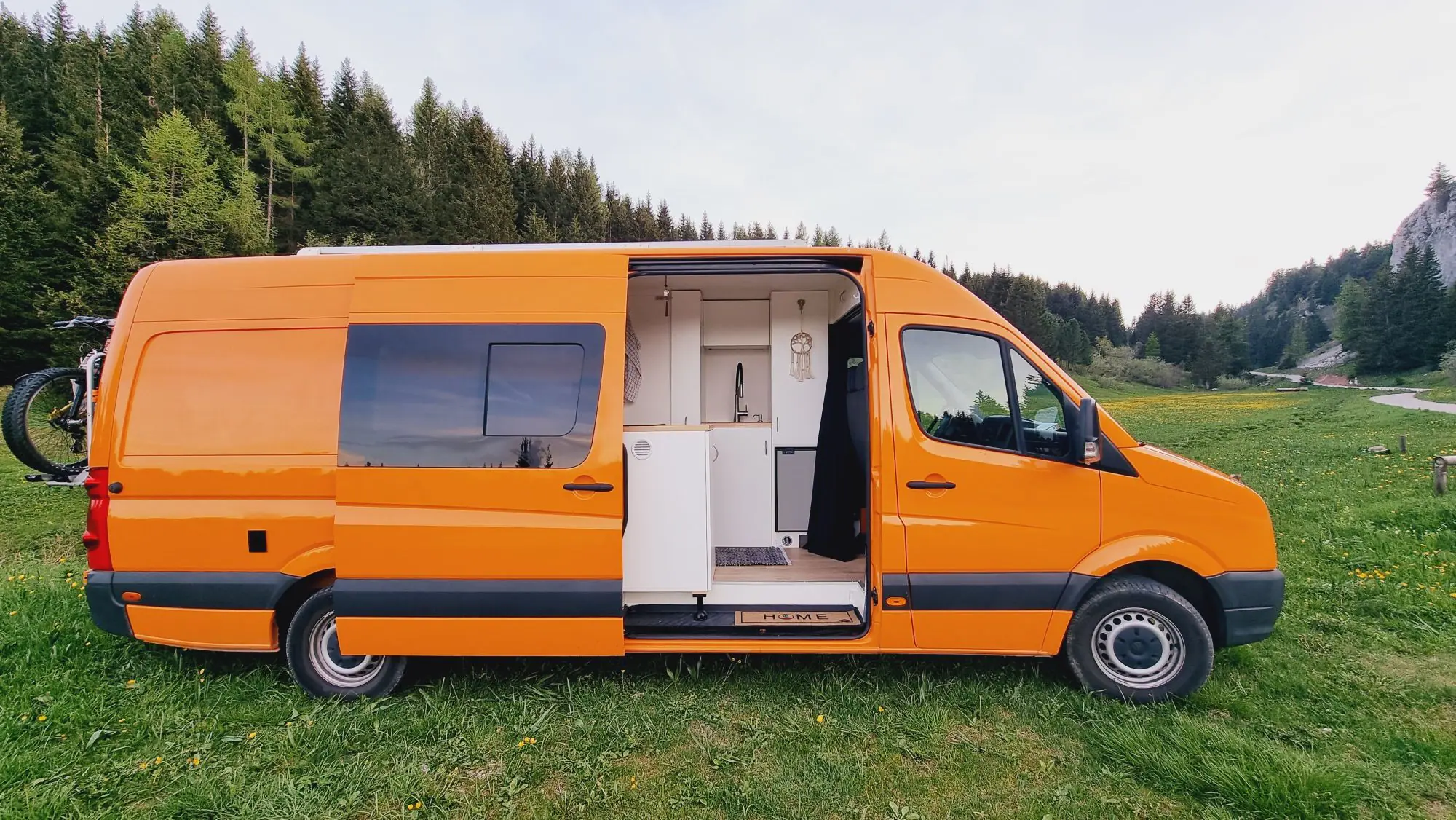
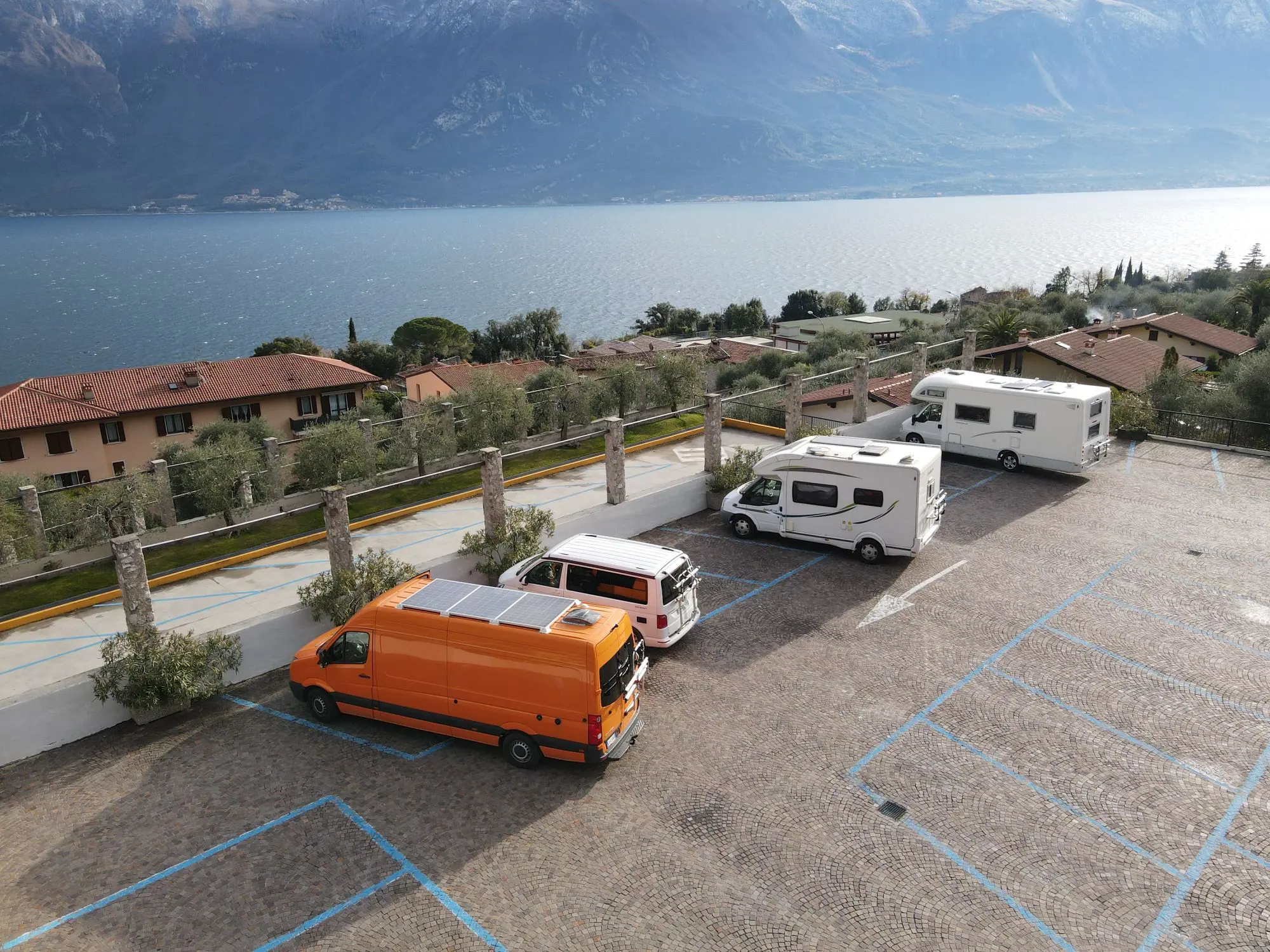
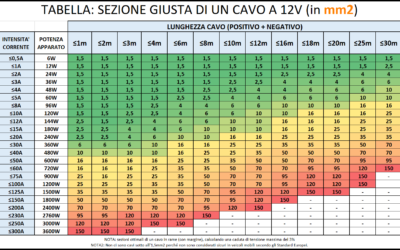


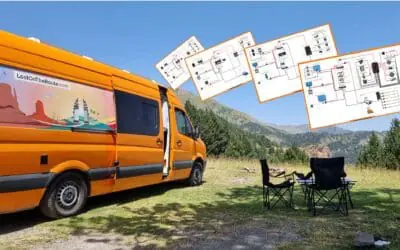

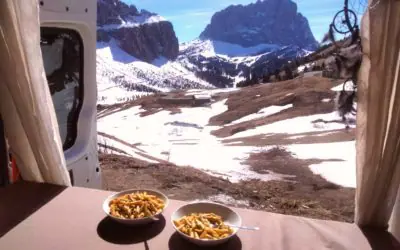

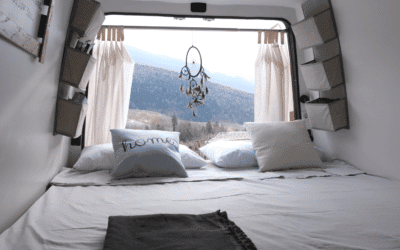
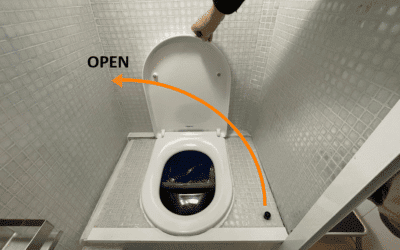
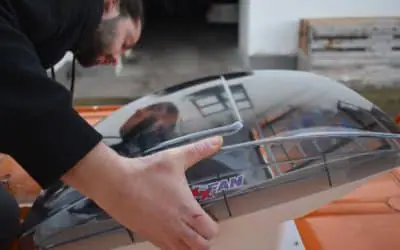
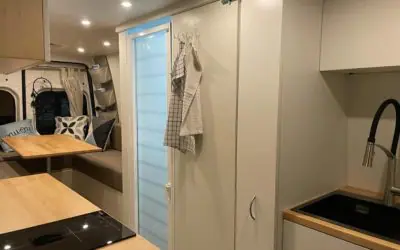




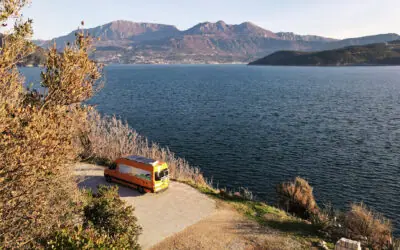
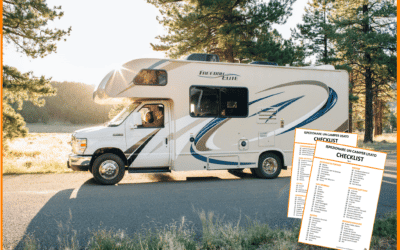
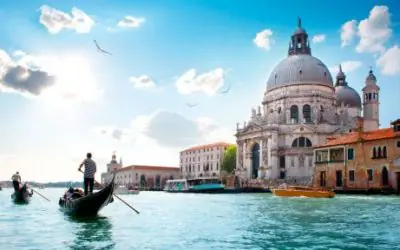

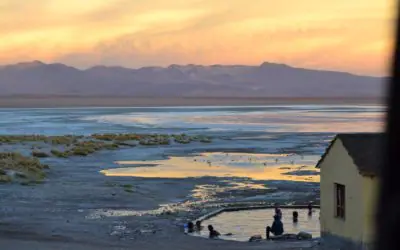
0 Comments